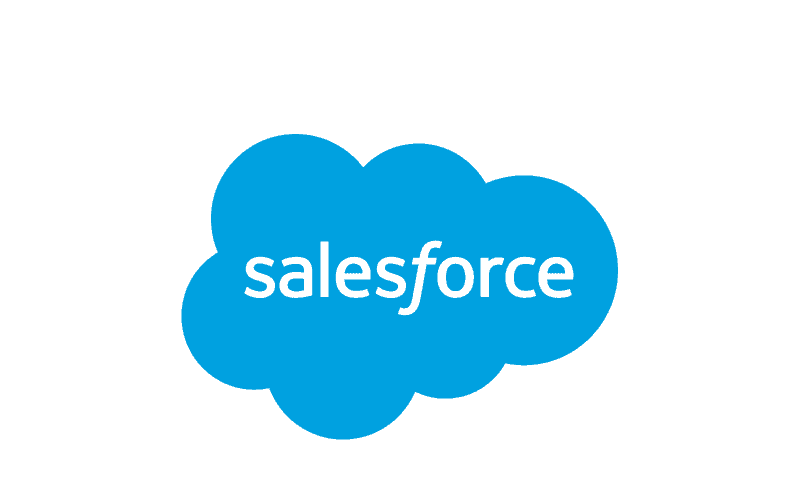Salesforce is a cutting-edge Customer Relationship Management (CRM) platform, based on the cloud, that revolutionizes how organizations manage their sales, marketing, and customer service endeavors. When harnessing the power of the cloud, Salesforce provides a comprehensive suite of tools and solutions, letting businesses simplify processes, nurture customer relationships, and drive sustainable growth. With a user-friendly interface, powerful analytics, and extensive customization options, Salesforce helps organizations of all sizes to achieve operational excellence, gain valuable insights, and deliver unparalleled customer experiences.
What is Salesforce?
Salesforce is a leading customer relationship management (CRM) platform that revolutionized the way businesses manage their interactions with customers and better day-to-day operations. The platform was created with the vision of providing organizations a comprehensive solution to effectively handle customer data, improve sales processes, and improve overall customer experience. Salesforce is a cloud-based software-as-a-service (SaaS) platform, which means it operates on the cloud and doesn’t require any on-premises installation or infrastructure.
AThe inception of Salesforce stemmed from the recognition that traditional CRM systems were often cumbersome, expensive, and required significant IT resources to implement and maintain. Salesforce aimed to address these challenges by offering a user-friendly, scalable, and customizable CRM solution that could be accessed anytime, anywhere via the internet. With the power of cloud computing, Salesforce eliminated the need for organizations to invest in costly hardware or software installations, making CRM accessible to businesses of all sizes.
Salesforce’s founders, Marc Benioff and Parker Harris, pioneered the concept of delivering CRM functionality through a subscription-based model, paving the way for a new era of cloud-based enterprise software. Since its launch in 1999, Salesforce has grown into a robust and feature-rich platform, catering to sales teams and marketing, service, and other departments within an organization. Its continuous innovation and commitment to customer success have propelled Salesforce to become a market leader, trusted by companies worldwide to optimize their customer relationships and drive business growth.
How does Salesforce work?
Salesforce operates on the principles of cloud computing and functions on a Software as a Service (SaaS) architecture, allowing organizations to access and utilize its features and functionalities through a web browser. The platform serves as a centralized hub for managing customer data, sales processes, marketing campaigns, and customer support.
At the ground level, the platform runs through a series of interconnected modules and components. These modules include Sales Cloud, Service Cloud, Marketing Cloud, and more, catering to different aspects of customer engagement. The platform stores and organizes vast amounts of customer data, including contact information, interactions, and preferences, providing a holistic view of each customer.
One key technical aspect of Salesforce is its ability to integrate with various systems and applications, including integration tools and APIs that improve data exchange between Salesforce and other business systems, such as ERP or marketing automation tools. This integration helps organizations to simplify their workflows, automate processes, and gain a comprehensive understanding of their customers.
Salesforce also links with advanced features like artificial intelligence (AI) and analytics. AI capabilities, such as Einstein AI, let organizations make better use of predictive insights, automate repetitive tasks, and personalize customer experiences. Analytics tools provide in-depth reporting and dashboards, allowing businesses to track performance metrics, identify trends, and make data-driven decisions.
Features of Salesforce
Salesforce offers a comprehensive suite of tools for developers and organizations. A section of the unique features include, but are not limited to:
1. Customizable workflow automation
Powerful workflow automation helps organizations to design and automate their business processes. With a user-friendly interface, users can create custom workflows without the need for extensive coding knowledge. This feature allows for the automation of repetitive tasks.
2. Advanced analytics and reporting
Comprehensive analytics and reporting capabilities allow organizations to gain valuable insights from their data. With features like customizable dashboards and comprehensive reporting tools, users can visualize and analyze key performance metrics. This helps identify trends, making informed decisions, and optimizing business strategies.
3. Artificial intelligence-powered sales and service
Salesforce incorporates artificial intelligence (AI) capabilities through its Einstein platform. With machine learning algorithms, organizations can benefit from AI-driven sales forecasting, lead scoring, and personalized customer service. These intelligent features help optimize sales processes, improve customer interactions, and drive better business outcomes.
4. Integration and data management
Integration with various third-party applications and systems enables smooth data exchange and synchronization. This feature facilitates a unified view of customer data across different platforms and improves collaboration within the organization. Additionally, Salesforce offers data management tools, ensuring data quality, security, and compliance.
5. AppExchange ecosystem
The vast ecosystem called AppExchange, which offers a wide range of pre-built applications and integrations. Organizations leverage these apps to extend functionality and address specific business needs. The AppExchange ecosystem provides a diverse marketplace for finding, evaluating, and implementing additional solutions within the Salesforce platform.
6. Mobile-first approach
Salesforce understands the importance of mobility in today’s business landscape. The platform offers mobile apps for iOS and Android devices, empowering users to access critical information and perform key tasks on the go. This mobile-first approach ensures flexibility and convenience, allowing users to stay connected and productive from anywhere.
Why should you use Salesforce for your team?
Salesforce offers over 2800 complimentary applications that can be used within or in tandem with the salesforce software. While very few organizations will actually be able to make use of all of these features, it means there is an application for every situation. Salesforce customers are able to pick and choose which applications they feel would benefit their business at no extra cost.
An additional 30 day free trial of Salesforce makes it a viable option for most businesses. This allows users to gain an insight into the applicability of Salesforce to their organization without the obligation of a paid subscription after. In short, you need only pay for Salesforce if you find it is beneficial for your business.
What are the benefits of Salesforce?
Scalable cloud infrastructure | As a leading cloud computing platform, Salesforce operates on a scalable infrastructure that can adapt to the evolving needs of organizations. With its Software as a Service (SaaS) model, Salesforce eliminates the need for on-premises hardware and provides flexible cloud-based solutions. This scalability means businesses can effortlessly accommodate growth, scale resources as required, and optimize their operations efficiently. |
Extensive AppExchange ecosystem | Salesforce’s AppExchange is an expansive marketplace offering a wide array of third-party applications, extensions, and integrations. This ecosystem helps organizations extend the functionality of their Salesforce instance by incorporating specialized tools tailored to their unique business requirements. Through AppExchange, businesses can access a diverse range of applications that increase productivity, data management, analytics, and other key aspects of their operations. |
Data security and compliance | Recognizing the critical importance of data security, Salesforce prioritizes security measures and compliance standards. The platform incorporates industry-leading security protocols, encryption mechanisms, and access controls to safeguard sensitive customer data. Moreover, Salesforce adheres to strict compliance frameworks, such as GDPR and HIPAA, ensuring organizations can confidently store, manage, and process data while adhering to legal and regulatory requirements. |
Customization and flexibility | With extensive customization options organizations tailor the platform to their specific business processes and requirements. With declarative development tools like Lightning App Builder and Process Builder, organizations can create custom workflows, automate tasks, and build personalized user interfaces without extensive coding knowledge. This flexibility lets organizations adapt Salesforce to their unique workflows and increase user productivity. |
Integration capabilities | Integration capabilities mean organizations connect their existing systems and data sources with the platform. Whether it’s integrating with popular third-party applications or connecting to internal databases, Salesforce’s integration tools and APIs simplify the process. This integration flexibility leads to a smooth data flow and gives a holistic view of customer interactions across multiple touchpoints, empowering organizations to make data-driven decisions. |
Continuous innovation and upgrades | Salesforce is renowned for its commitment to continuous innovation and regular platform upgrades. As a cloud-based solution, organizations can benefit from the latest features and enhancements without the need for complex and costly software upgrades. Consistent introduction of new functionalities, improved user experiences, and cutting-edge technologies helps Salesforce stay ahead of market trends and give organizations the most up-to-date CRM capabilities. |
Strong community and support | A thriving community of users, developers, and experts who actively contribute to its ecosystem. The Salesforce Trailblazer Community offers a platform for users to connect, share best practices, seek guidance, and gain insights into optimizing their Salesforce implementation. Additionally, Salesforce provides comprehensive support resources, including documentation, knowledge bases, and expert assistance, so organizations receive the assistance they need to maximize their investment in the platform. |
AI-Powered analytics and insights | Artificial intelligence (AI) capabilities provide advanced analytics and insights to organizations. When harnessing AI technologies like Einstein Analytics, Salesforce increases valuable data-driven insights, automates processes, and makes informed decisions. These AI-powered features help optimize sales forecasting, marketing campaigns, customer segmentation, and personalized customer experiences. |
Who uses Salesforce?
Salesforce is a widely adopted customer relationship management (CRM) platform utilized by organizations across various industries. It is trusted by both small businesses and large enterprises alike. Three prominent organizations that rely on Salesforce are Coca-Cola, American Express and Samsung.

Coca-Cola uses Salesforce to enhance its sales and marketing processes. With Salesforce, Coca-Cola effectively manages customer data, sales operations, and customer interactions. The platform helps create personalized marketing campaigns, track leads, and monitor customer engagement, resulting in improved customer satisfaction and increased sales opportunities.

American Express makes use of Salesforce for its customer service and support capabilities. Salesforce’s Service Cloud lets American Express to centralize customer inquiries, manage cases efficiently, and provide personalized assistance to its customers. When utilizing Salesforce, American Express enhances its ability to deliver exceptional customer experiences.

Samsung uses the CRM system to drastically improve their customer experience during the COVID-19 Pandemic. As the world had to rapidly adapt and became far more reliant on digital services, Samsung utilized Salesforce to improve customer issue resolutions to 88%, all while other organizations struggled to keep pace with the demand.
“We were seeking an agile framework to support both customer and agent experience – which we’ve found with Salesforce.”
– Gareth Hobson
Head of B2B Customer Experience Operations Samsung Electronics UK and Ireland
What are the disadvantages of Salesforce?
Complexity and learning curve
Being a feature-rich platform, Salesforce can be quite complex, resulting in a steep learning curve for end users. The extensive range of tools, modules, and customization options may require significant time and resources for organizations to fully comprehend and utilize effectively. Adequate training and ongoing support are essential to mitigate this challenge.
Cost and scalability
While offering comprehensive solutions, the associated costs can be a significant consideration. The licensing fees, customization expenses, and additional add-ons can quickly add up, making it a substantial investment for organizations, especially small and medium-sized businesses. Additionally, as organizations scale and require more user licenses or advanced functionalities, the costs can further escalate.
Customization limitations
Although a wide range of customization options are available, there are certain limitations that organizations may encounter. Customizing certain aspects of the platform, such as complex workflows or specific data models, may require advanced technical expertise or the involvement of Salesforce consultants, which can add to the overall implementation cost and time.
Integration challenges
Integration with existing systems and third-party applications can sometimes present challenges. While Salesforce offers various integration tools and APIs, maintaining proper data flow and compatibility with legacy systems or niche applications may require additional development efforts and expertise. Careful planning and technical considerations are necessary to avoid disruptions during the integration process.
Dependency on internet connectivity
As a cloud-based platform, organizations using it heavily rely on stable internet connectivity. Any network disruptions or downtime can potentially hinder access to critical data and impact day-to-day operations. Implementing backup measures and contingency plans are vital to minimize the impact of such disruptions.
Data security and privacy
While Salesforce takes extensive measures on data security and privacy, organizations must be diligent in managing their data within the platform. Administering appropriate access controls, defining data sharing rules, and staying updated with Salesforce security best practices are essential to maintain data integrity and protect sensitive information from unauthorized access.

